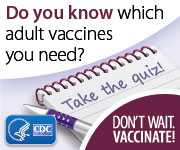Vaccines for Immigrants and Refugees
Refugees and immigrants seeking admission into the U.S. are required to have a medical examination.
During the medical examination, a healthcare professional checks for specific diseases and assesses immunization status. The healthcare professional may run blood tests to find out which vaccines the refugee or immigrant may need. For more information, see Medical Examination of Immigrants and Refugees.
Vaccination for Immigrants
Amina with her two children Mohamed and Sundes. Twelve years after fleeing her homeland of Somalia, she is settling into a permanent home.
Persons applying for an immigrant visa overseas and persons applying for legal permanent residence within the United States (known as status adjustment) are required to provide proof of vaccinations as a part of the medical examination process. If they do not already have proof, they must begin vaccination according to the CDC Vaccine Technical Instructions for the overseas exam or adjustment of status examination. The vaccination schedules in the Technical instructions are based on immunization schedules recommended by the Advisory Committee on Immunization Practices (ACIP).
For answers to questions about immunization and immigration, see Vaccination Criteria for U.S. Immigration.
For resources to support immunization and healthcare of immigrants, contact the state health department where the immigrants will settle.
Vaccination for Refugees
Although refugees are not required to have vaccinations before arrival in the United States, CDC, in collaboration with the Department of State, developed a Vaccination Program for U.S.-bound Refugees, which started in 2013 and is in the process of expansion. The goals of this program are to improve the health of refugees before and during travel, to reduce the risk of vaccine-preventable disease outbreaks, and to expedite school entry for children after arrival. As part of this program, refugees start the series of certain ACIP-recommended vaccinations during their overseas medical examination, before travel to the United States.
After one year in the US, refugees can apply for a change of status to that of legal permanent resident. At that time, they will be required to be fully vaccinated in accordance with CDC Technical Instructions for the status adjustment medical examination. Refugee vaccinations after arrival in the United States are paid for by various domestic agencies, including state and local health departments, Medicaid, the federal Vaccines for Children Program, and the Refugee Medical Assistance program of the U.S. Department of Health and Human Services' Office of Refugee Resettlement.
For resources to support immunization and healthcare of refugees, contact the state health department where the refugees will settle.
You can also find guidelines on Evaluating and Updating Immunizations during the Domestic Medical Examination for Newly Arrived Refugees.
Vaccination and International Adoption
Children entering the United States as adoptees are considered immigrants under immigration law. So, they must also provide proof of vaccination during the overseas medical examination. However, for adoptees 10 years of age and under, immigration law allows for their adoptive parents to sign an affidavit stating they will be vaccinated after arrival to the United States. For information on the medical examination process for adoptees, see International Adoption: Health Guidance and the Immigration Process.
Resources
- Page last reviewed: December 19, 2016
- Page last updated: December 19, 2016
- Content source:



 ShareCompartir
ShareCompartir